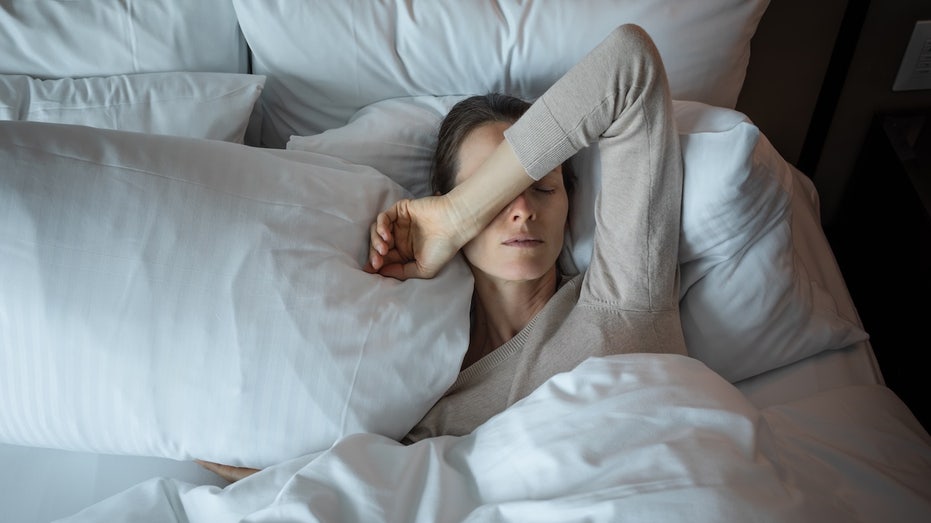
WWW.FOXNEWS.COM
Dementia risk nearly doubles among those with common sleep disorder, study finds
In the latest evidence of the direct relationship between sleep and health, researchers have found that chronic insomnia can significantly increase dementia risk.That equates to a three-year acceleration of brain aging, according to the study, which was published in Neurology, the journal from the American Academy of Neurology.The study followed 2,750 cognitively healthy older adults averaging 70 years of age over a period of more than 5- years. Roughly 16% of them suffered from chronic insomnia, according to a press release for the study.WOMAN'S SNORING WAS SYMPTOM OF RARE FORM OF CANCER: 'DON'T IGNORE IT'"Chronic insomnia" is defined as a struggle to fall and/or stay asleep which is different than people trying to pursue the "perfect sleep," according to study author Diego Z. Carvalho, M.D., of the Mayo Clinic in Rochester, Minnesota."Chronic insomnia was associated with a 40% increased risk of developing cognitive impairment and dementia," Carvalho, who is also a member of the American Academy of Neurology, told Fox News Digital.Over the course of the study, 14% of the people with chronic insomnia developed mild cognitive impairment or dementia, compared to 10% of those who did not have the sleep disorder.The researchers were surprised to find that participants with chronic insomnia who reported sleeping more than usual had fewer white matter spots in the brain areas where small vessel disease may have damaged brain tissue, which have been linked to cerebrovascular disease.HIDDEN SLEEP DANGER COULD INCREASE RISK OF 172 DISEASES, MAJOR STUDY REVEALSAdditional tests also found that this group scored lower in thinking skills. This was after adjusting for other factors like age, high blood pressure, sleep medications and sleep apnea diagnoses."Participants with chronic insomnia with perceived reduced sleep duration had poorer brain health, according to brain imaging findings linked to Alzheimers disease and cerebrovascular disease," Carvalho said.People who had the APOE 4 gene, which is linked to a higher risk of Alzheimer's, were more likely to show bigger declines in memory and thinking skills, the study found.Based on these findings, chronic insomnia could be a potentially modifiable risk factor for cognitive impairment and dementia, according to Carvalho."This reinforces the importance of treating chronic insomnia not just to improve sleep quality, but potentially to protect brain health as we age," he said. "Our results also add to a growing body of evidence that sleep isn't just about rest it's also about brain resilience."Dr. Marc Siegel, senior medical analyst for Fox News in New York, was not involved in the study, but said that it shows an "important association" between sleep deprivation and dementia or cognitive impairment.NEW MRI BRAIN SCAN PREDICTS ALZHEIMER'S RISK YEARS BEFORE SYMPTOMS DEVELOP"We already know that the brain self-cleanses waste products during sleep, and that sleep is restorative to brain cells but we still dont know whether the effect observed here is directly due to inattention from sleeplessness (on testing) and memory effects that could be short term," he told Fox News Digital."The issue of actual neurodegeneration due to insomnia is probable, but not proven by this study."The cognitive decline could be directly due to the insomnia itself or to the breakdown of brain function that occurs as a result, Siegel added.Dr. Earnest Lee Murray, aboard-certified neurologist at Jackson-Madison County General Hospital in Jackson, Tennessee, confirmed that chronic insomnia has long been known to lead to health concerns, both neurologically and non-neurologically."The study emphasizes that even a short period of chronic insomnia can lead to potential detrimental cognitive effects later in life," Murray, who was not involved in the research, told Fox News Digital."The study also showed chronic insomnia seems to alter the structure of the brain by increasing white matter changes commonly seen in patients with vascular pathology, such as hypertension and diabetes."The study did have some limitations, the researcher noted."We did not have instruments to assess the severity of insomnia at baseline or over time," Carvalho told Fox News Digital. "We lack longitudinal objective sleep data to look at sleep duration estimates over the years."The researchers were also unable to adjust for which patients received treatment for obstructive sleep apnea, such as CPAP therapy."We also did not have full information on the duration of usage or doses of sleep medication," Carvalho added.He also reiterated that the study does not prove that insomnia directly causes brain aging, only that there is an association between the two.Anyone suffering from insomnia on a frequent basis should talk with their physician about ruling out potential medical reasons, Lee advised."Treatment may include cognitive behavioral therapy, or pharmaceutical therapy may be an option," he said.The researchers recommended adopting better sleep practices, including cutting out caffeinated beverages in the afternoon, cutting down on alcohol consumption, avoiding large meals or exercise before going to bed, and reducing exposure to electronics prior to bedtime.CLICK HERE TO SIGN UP FOR OUR HEALTH NEWSLETTERThe researcher did warn that pursuit of the "perfect sleep" can sometimes lead to an obsession with excessive tracking of sleep data, leading to "performance anxiety," which can end up having the opposite effect."Tracking does not help with your sleep good sleep practices do," he said.Carvalho also urged caution when it comes to taking a pill for better sleep."Although sleep medications can help and are available for patients with chronic insomnia, they do not work very well in the long run if good sleep practices are not adopted," he said. "There is no solution for poor sleep issues that does not start with the patient doing the right things."Murray echoed the importance of good sleep hygiene, including not using electronic devices in bed and limiting the amount of light exposure in the room to enhance the quality of sleep.For more Health articles, visitwww.foxnews.com/healthThe study was supported by the National Institutes of Health, GHR Foundation, Mayo Foundation for Medical Education and Research, and a grant from Sleep Number Corporation to the Mayo Clinic.
0 Comentários
0 Compartilhamentos
28 Visualizações
0 Anterior



